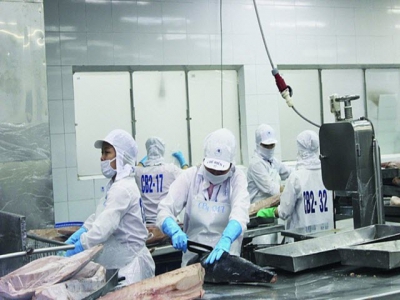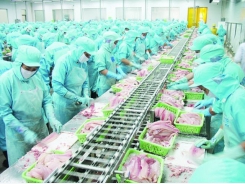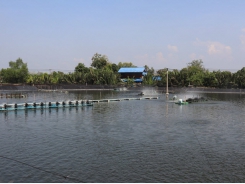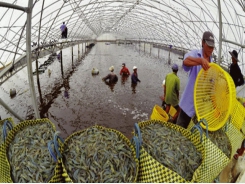Remove bottlenecks for export seafood

To open the door to export seafood, one of the bottlenecks that businesses are interested in the beginning of 2019 is to remove the "yellow card" of exported seafood.
Processing tuna for export. Photo: T.H
Waiting for judgment on the "yellow card"
According to Mr. Truong Dinh Hoe, Secretary General of Vietnam Association of Seafood Exporters and Producers (VASEP), there is still no accurate information on when the European Commission (EC) inspection team will come to Vietnam to consider the problem of overcoming the "yellow card" of seafood.
As planned, in early 2019, the EC Inspection Team will return to Vietnam to inspect and assess the situation and the results of implementing the EC commission’s regulations against illegal, unreported and unregulated fishing (IUU). However, this plan has been delayed. This is the third time the EC has inspected related to the IUU. Earlier, from May 15 to 24, 2018, the EC Inspection Team did practical work and inspections in some localities. Then, in October 2018, the European Parliament also worked and checked the situation for overcoming the "yellow card" in Vietnam.
Since October 23, 2017, when the EC announced the application of warning measures - the "yellow card" for Vietnamese seafood products exported to the European Union (EU), with the efforts and fierceness of the political system, Vietnam has added the international and regional regulations on anti-exploitation of IUU into the 2017 Fisheries Law and guiding documents. The propaganda and dissemination for relevant organizations and individuals to clearly understand the "yellow card" has been promoted in localities, including strict measures to handle violating fishing vessels. In particular, the localities have publicly announced the list of violating fishing vessels in the exploitation and fishing. In addition to naming on the mass media, the localities also requested functional agencies to investigate, verify and strictly handle according to the provisions of law.
In the whole country, there are 28 coastal localities with nearly 110 thousand fishing vessels, of which about 33 thousand offshore-fishing boats, all must comply with the EC’s warning and regulations to remove the "yellow card". At the same time, strictly inform the Conclusion No. 300/TB-VPCP dated August 17, 2018 of the Government Office, on the implementation of the Prime Minister's Directive No. 45/CT-TTg on a number of urgent tasks and solutions to overcome the EC's warning, considering it as one of the top political tasks.
In particular, the Fisheries Law came into effect right from the beginning of 2019. At the same time, issuing a plan to implement the National Agreement on Ports that Vietnam has just joined, as well as completing the accession to the UN Fish Stocks Agreement... is also one of Vietnam's efforts to overcome the “yellow card” to boost seafood exports to the EU market.
Overcome technical barriers
In addition to overcoming the "yellow card" to boost exports, Vietnam's fisheries sector also faces some difficulties in technical barriers. Currently, the issue of equivalence recognition for the Vietnamese pangasius industry in the US catfish inspection program, the Food Safety and Inspection Service (FSIS) under the United States Department of Agriculture’s (USDA) has proposed to the US Federal Register for the equivalent recognition of Vietnamese pangasius. Accordingly, the US Federal Register also posted a draft comment on the mentioned FSIS's proposal. The proposal was posted publicly and consulted widely for 30 days from mid-September 2018. However, so far the US side has not yet made a final decision. Vietnam is still waiting for the US equivalent recognition. The fact that the US side has not yet made a final decision in writing for the equivalent recognition of Vietnamese pangasius industry in particular and catfish in general, even though the deadline has passed, means that exporting this type of Vietnamese seafood to the US is still open-ended.
Similarly, the US Seafood Import Monitoring Program (SIMP) that applied to 13 types of seafood entering this market since early 2018, is also causing difficulties for the procurement of raw materials to meet the origin requirements of Vietnamese processors. "Such challenges are also an opportunity for us to look back on the whole industry, to reorganize the stages of catching, preserving and transporting…," VASEP’s representative said.
Mr. Tran Van Linh, Chairman of Thuan Phuoc Commercial Seafood Company, said that the plan to increase shrimp turnover from 3.6 billion USD in 2018 to 4.2 billion USD in 2019 is under pressure. Besides the large inventory in major markets due to the recent severe winter and the growth of aquaculture competitors such as India and China, Vietnamese aquaculture industry is still struggling to find solutions to the problem of production costs to be more competitive in exporting ...
* At the beginning of January 2019, at the meeting with Mrs. Heidi Hautala, Vice President of the European Parliament (EP), Prime Minister Nguyen Xuan Phuc said, right after the EC warned with the "yellow card" related to Vietnam's seafood exploitation, the whole political system of Vietnam has focused on and drastically implemented solutions to abide by the EC commission’s regulations. In particular, Vietnam determined that the prevention and termination of fishing vessels illegally exploiting seafood in foreign waters, and certification of origin of exploited seafood are key tasks. Vietnam's policy is to implement a sustainable fisheries development; to prevent, combat and stop illegal, unreported and unregulated fishing activities. The PM proposed that the EP Vice President be interested in pushing the EC to actively consider Vietnam's efforts to soon remove the "yellow card" for Vietnam's seafood exports to the EU.
* On the sidelines of the WEF Davos Conference on January 24, 2019, Prime Minister Nguyen Xuan Phuc asked the EU to support Vietnam in handling the IUU exploitation and soon remove the "yellow card" for Vietnam's seafood exports to the EU.
Có thể bạn quan tâm
Phần mềm

Phối trộn thức ăn chăn nuôi

Pha dung dịch thủy canh

Định mức cho tôm ăn

Phối trộn phân bón NPK

Xác định tỷ lệ tôm sống

Chuyển đổi đơn vị phân bón

Xác định công suất sục khí

Chuyển đổi đơn vị tôm

Tính diện tích nhà kính

Tính thể tích ao hồ




 Dutch firm leads fish oil-free aquafeed challenge
Dutch firm leads fish oil-free aquafeed challenge  Kiên Giang province will expand shrimp farming models…
Kiên Giang province will expand shrimp farming models…